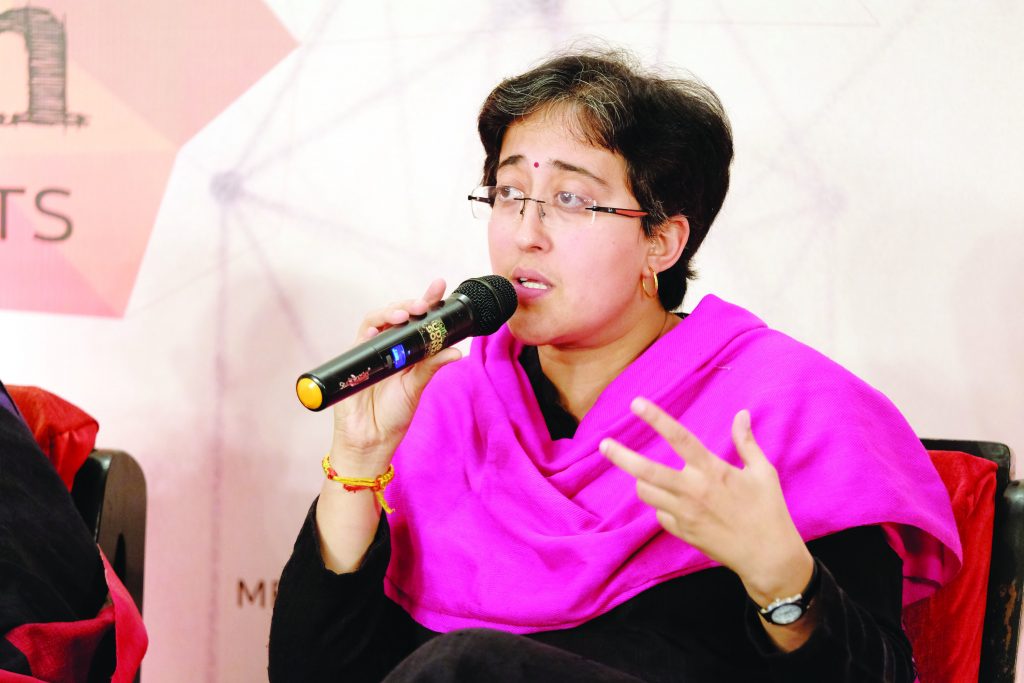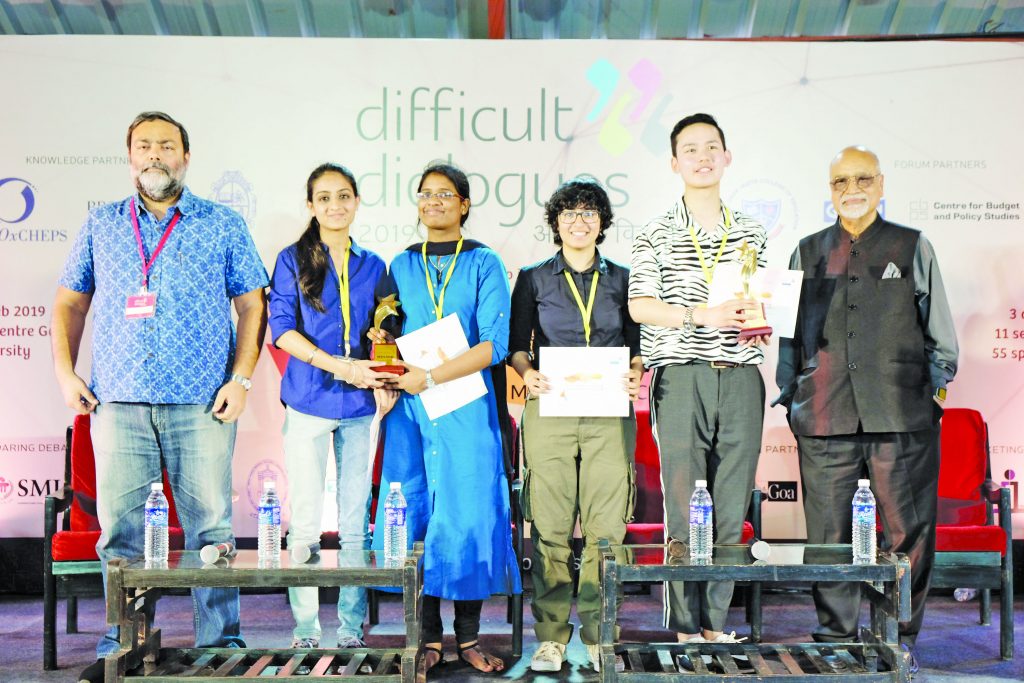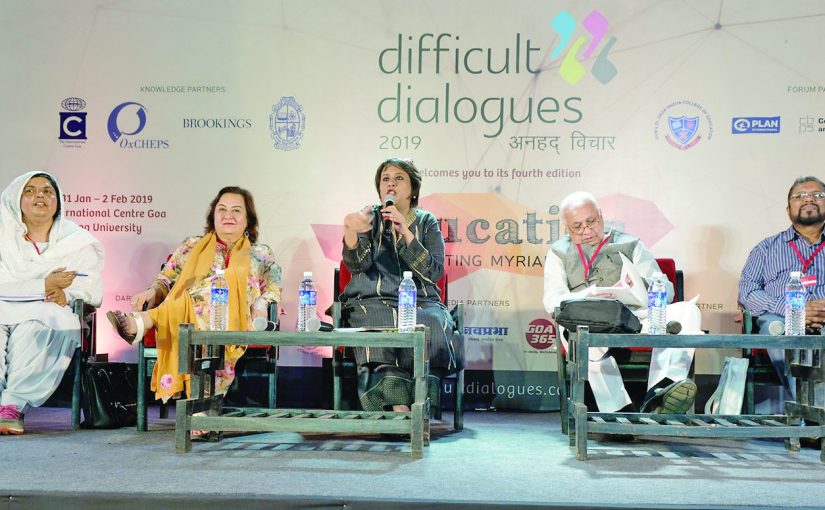At Difficult Dialogues: Panel on the subject of “Should religion be a part of education?” Barkha Dutt led the discussion with Arif Mohammed Khan, Dr Neelam Kaur, Dr Pinky Anand and Clifford deSilva
By Our Special Correspondent
THERE is a lot of unrest in the country and it is not only political. This year’s subject at the three-day Difficult Dialogues forum which started at the Goa University and continued at the International Centre Goa over several sessions from January 31 to February 2, 2019, was devoted towards illuminating the myriad facets of education. Where is education headed in this country and what are its current trials and tribulations?
Over various sessions eminent speakers, academic experts and others concerned discussed the subject threadbare and this threw up more questions about whether our education primary, secondary and college level needs to be drastically reformed to keep pace with the times? Is it just all about educating minds, changing mindsets, building world class universities? What is value education, education for all, financing education and much more, not least of all the looming Damocles sword of government control over education, which may be good, bad or ugly?
Government manipulation of educational systems to serve its own political ends is very real as one session — “Threats to Academic Freedom” — enlightened and opened up a pandora’s box of evils. Freedom to speak may be a cardinal principle courtesy the Indian Constitution but ever since the Bharatiya Janata Party came to power this freedom has been intimidated, compromised and is finally turning into a farcical tragedy. Is fear creeping insidiously into our educational institutions across the spectrum to enforce majoritarian opinion in a country which lives by democracy and are citizens’ fundamental rights slowly being eroded?
In this most sensitive of sessions there were several speakers. Hindi Prof Apoorvanand Jha of Delhi University listed the number of professors from the academic world being targeted for “anti-national” or “anti-army” and generally speaking dubbed as “urban naxalites. ” The latest example of this being the case of Prof Anand Teltumbde of the Goa Institute of Management (GIM) who was arrested in the early of the morning from Mumbai airport on Feb 2. Prof Jha didn’t mince words about how the imposition of a majoritarian Hindutva political viewpoint and targeting of professors like Nivedita Menon, Romila Thapar and several others will be detrimental to the spirit of freedom of expression in institutions of higher learning in the country.
The threats come from the BJP and its parental RSS groups, said Prof Jha, and in the short or long run any effort to discuss or question anything will mean raising the hackles of those in charge of education policy and a fear psychosis taking over. Other speakers in this debate included Dr Bhushan Patwardhan of the University Grants Commission, Dr Manisha Priyam of the National University of Educational Planning & Administration (NUEOPA) and Prof R Sudarshan, Dean of O P Jindal Global University. From the sound of it there is so much money with the ruling party that it can buy up just about anyone willing to play the game of spying for the cause of targeting those who are “guilty” of holding views contrary to the ones espoused by the establishment of the day.
Clearly, this was the daring session of the Difficult Dialogues forum this year which was moderated by Dr Paul Flather (Fellow of Mansfield College, Oxford University) who in a very brief chat later when asked if he sees the German Nazi experience repeating itself in India, said a categorical no. Political threats to freedom of expression exist around the world and there is nothing to do but fight it in all the ways until they go away, “I think all this is happening partly because of an economic backlash.” For him universities must necessarily be “a noisy marketplace of ideas where free speech is celebrated rather than dumbed down.”
Perhaps the most useful and lively session was the one featuring a multi-city college debate competition moderated by actor Pooja Bedi on the topic: “Is the Indian curriculum and is teaching method redundant?” By the time the contestant teams finished speaking for or against the motion nobody was quite sure whether Indian education is “catastrophically” terrible or just in urgent need of judicious upgrading to fit in with our technologically advanced times. One student’s memorable opinion, “Education must not equip us with a mirror but with a window to see the world!”
This is possibly in keeping with the often quoted Mahatma Gandhi observation about keeping the windows of the mind open for all kinds of ideas to blow in and out – but reserving the right to retain and cherish only those which are worth retaining in life’s larger perspective! Or something like that. Anmol Kang from Manipal Institute of Medical Sciences in Gangtok , Sikkim, and P Lokeshwari from Pondicherry Institute for Medical Sciences were the winners in this debate session titled Daring Debate.
A concluding panel discussion out on the lawns of the International Centre Goa had all eyes on celebrated journalist Barkha Dutt who moderated a fiery session on “Should religion be a part of education?” On the panel were additional solicitor general of India Pinky Anand, former cabinet minister Arif Mohammed Khan, Clifford W DeSilva (Director, Goa Institute of Counseling ) and Dr Neelam Kaur of the Akal Academy.
When Barkha Dutt started the session by asking the audience to put up their hands if they believed that religion should be part of education, only a hand full of hands swayed up! Clearly, the majority are not for religious education in schools, colleges or universities. Interestingly, other streams of thought in this session threw up suggestions like all religions should be studied or none at all; someone suggested that there should be a department of religious studies in all universities, why do Indian universities lag behind in this respect?
Expressing her own opinion, Barkha Dutt said she was not for any kind of dogma in religious learning and in a country like India where religion is multi-dimensional and multi-cultural it is best to keep it out of the political arena. Politics in religion is bad news for any democracy if it wants to grow up and thrive all around without absurd discrimination on the basis of religion.
In conclusion it was three days of not so difficult and useful dialogues offering an overview of critical educational issues facing the country – from the overwhelming takeover of new technology to counseling of students suffering from mental health issues, the challenge of creating up-to-date curricula for a country as diverse as India, not forgetting the inclusion of parental role in helping strengthen school management to benefit their children in the long run.
Interestingly, on the subject of student suicides because of inability to handle harsh curriculums, Srinivasan Vadivel of the National Council of Educational Research & Training (NCERT) in panel discussion “Curriculum and Pedagogy” observed, “What the world teaches children later on, we teach them much earlier. But rather than reducing the burden, parents want us to include more so that students can get better jobs!”
One cannot miss the irony of there being fewer and fewer jobs for the vast number of job-seekers entering the job market annually in India — with thousands applying for subordinate government jobs to ensure themselves a secure if not a happy future.
(Difficult Dialogues is an annual forum examining critical issues in South Asia, it is being facilitated by UK-based philanthropist Surina Narula who obviously has the interests of India and especially the plight of homeless children close to her heart. The Difficult Dialogues forum has Anil Gupta as chairperson, Oroon Das-director, and on the advisory committee are Amrita Bhalla, Pooja Sood, Yatin Kakodkar-ICG chairperson and Prof Varun Sahni-vice-chancellor of Goa University.)


Speaking at the one of the six panels at Difficult Dialogues was Aam Aadmi Party’s Atishi Marlena who has played a key role in turning around the standard of public education in Delhi. Speaking on the subject of elementary education she made a pertinent observation, “What has really changed is that there is political wil, where the government in power cares about private schools. Someone should research the links between politicians and private schools. Arvinder Singh Lovely is a politician who owns a private school. If the people in power have incentives in private education then why would they improve public education?”
Other speakers like Dr Yasmin Ali Haque, the UNICEF representative in India, speaking about the financing of education, added, ”Only two percent of the education budget is spent on teacher training so we’re not spending on the human resources for this sector. Government funding is being supplemented by CSR or grant funding.” Teacher training plays a key role in the quality of education being imparted to school children and if teachers are not motivated enough for one reason or another the public education scenario remains as dismal as it is in India in very many places.
Dr Sukanya Bose, Faculty at the National Institute of Public Finance & Policy, New Delhi, said there is no financial roadmap in place for financing education which would lead to what was laid out in the Right to Education Act of 2009. There are around 146 million children in the public education system and 15 million outside the system, which is the government’s responsibility to bring them back. According to her there is a need to spend 1.5% of the GDP in education.

